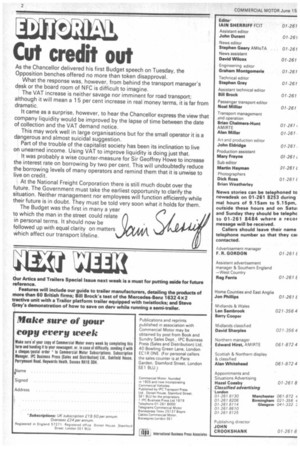Cut credit out
Page 4

If you've noticed an error in this article please click here to report it so we can fix it.
As the Chancellor delivered his first Budget speech on Tuesday, the Opposition benches offered no more than token disapproval.
What the response was, however, from behind the transport manager's desk or the board room of NFC is difficult to imagine.
The VAT increase is neither savage nor imminent for road transport; although it will mean a 1 5 per cent increase in real money terms, it is far from dramatic.
It came as a surprise, however, to hear the Chancellor express the view that company liquidity would be improved by the lapse of time between the date of collection and the VAT demand notice.
This may work well in large organisations but for the small operator it is a dangerous and almost suicidal suggestion.
Part of the trouble of the capitalist society has been its inclination to live on unearned income. Using VAT to improve liquidity is doing just that. It was probably a wise counter-measure for Sir Geoffrey Howe to increase the interest rate on borrowing by two per cent. This will undoubtedly reduce the borrowing levels of many operators and remind them that it is unwise to live on credit.
At the National Freight Corporation there is still much doubt over the future. The Government must take the earliest opportunity to clarify the situation. Neither management nor employees will function efficiently while their future is in doubt. They must be told very soon what it holds for them.
The Budget was the first in many a year to which the man in the street could relate in personal terms. It should now be followed up with equal clarity on matters which affect our transport lifeline.




























































































































